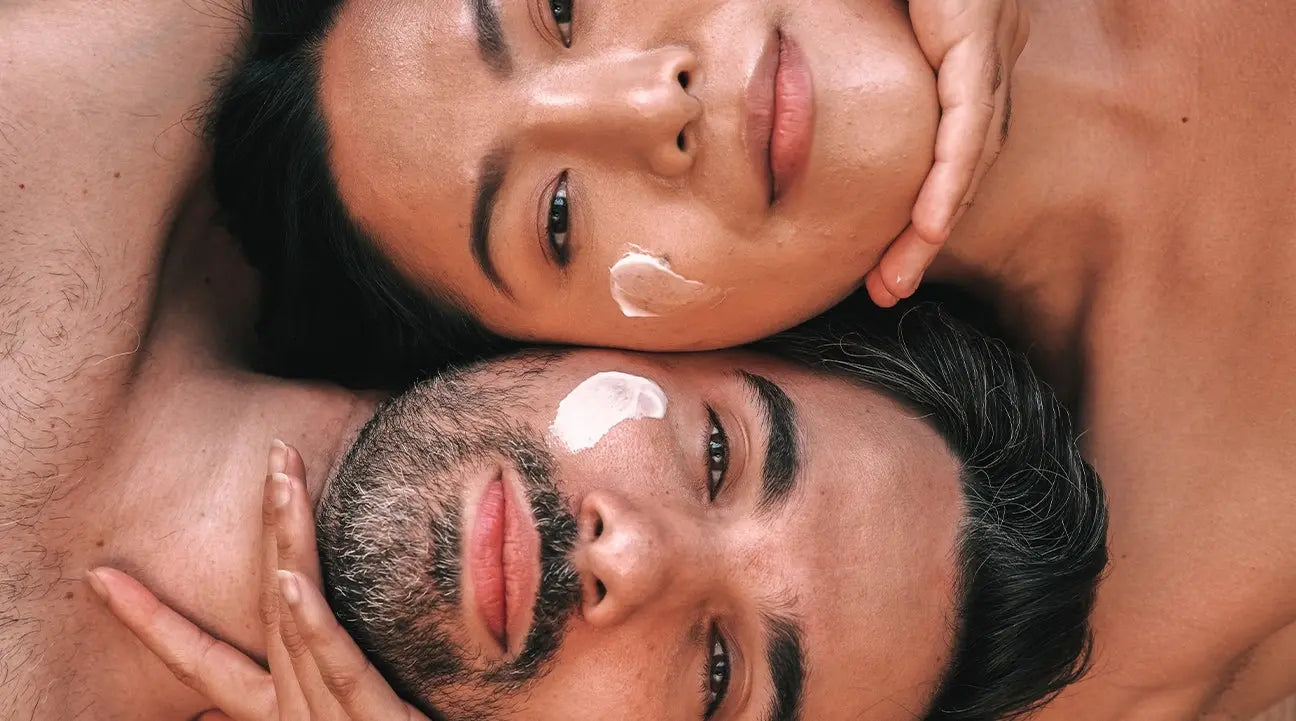The Science Behind Skin Aging
Intrinsic Skin Aging
- Genetic Predisposition: Your genes significantly affect how your skin ages, accounting for up to 60% of variations in skin aging. Some people may naturally have more resilient skin, while others may be more prone to wrinkles and sagging.[2]
- Cellular Senescence: As you age, your cells gradually lose their ability to divide and function properly. This process, known as cellular senescence, leads to the accumulation of ‘zombie’ cells in your skin that secrete inflammatory compounds which contribute to wrinkles and loss of elasticity.[3]
- Decreased Collagen Production: Collagen is a protein that provides structure and support to your skin. Due to various factors like hormonal changes and the accumulation of senescent cells, your body produces less collagen as you age, leading to thinner, less resilient skin.[4]
The Science Behind Skin Aging
Intrinsic Skin Aging
- Genetic Predisposition: Your genes significantly affect how your skin ages, accounting for up to 60% of variations in skin aging. Some people may naturally have more resilient skin, while others may be more prone to wrinkles and sagging.[2]
- Cellular Senescence: As you age, your cells gradually lose their ability to divide and function properly. This process, known as cellular senescence, leads to the accumulation of ‘zombie’ cells in your skin that secrete inflammatory compounds which contribute to wrinkles and loss of elasticity.[3]
- Decreased Collagen Production: Collagen is a protein that provides structure and support to your skin. Due to various factors like hormonal changes and the accumulation of senescent cells, your body produces less collagen as you age, leading to thinner, less resilient skin.[4]
Extrinsic Skin Aging
- Sun Exposure: Ultraviolet (UV) radiation from the sun is one of the primary causes of extrinsic aging. Characterized by wrinkles, sunspots, and an increased risk of skin cancer, up to 80% of the visible signs of aging can be attributed to UV exposure.[5] At the same time, even visible blue light can create oxidative stress in the skin by producing ROS, accelerating the aging process.[6]
- Pollution: Environmental pollutants can penetrate your skin, causing oxidative stress, which leads to inflammation and accelerating aging.[7]
- Lifestyle Factors: Smoking, poor diet, and lack of sleep can all contribute to premature skin aging. These factors increase oxidative stress and inflammation, which damage your skin over time.[8]
Extrinsic Skin Aging
- Sun Exposure: Ultraviolet (UV) radiation from the sun is one of the primary causes of extrinsic aging. Characterized by wrinkles, sunspots, and an increased risk of skin cancer, up to 80% of the visible signs of aging can be attributed to UV exposure.[5] At the same time, even visible blue light can create oxidative stress in the skin by producing ROS, accelerating the aging process.[6]
- Pollution: Environmental pollutants can penetrate your skin, causing oxidative stress, which leads to inflammation and accelerating aging.[7]
- Lifestyle Factors: Smoking, poor diet, and lack of sleep can all contribute to premature skin aging. These factors increase oxidative stress and inflammation, which damage your skin over time.[8]
How Skin Aging Impacts Longevity
Inflammaging: A Root Cause of Aging
How Skin Aging Impacts Longevity
Inflammaging: A Root Cause of Aging
Shifting Skin Care from Symptoms to Root Causes
The Subjectivity Problem in Skincare Claims
Shifting Skin Care from Symptoms to Root Causes
The Subjectivity Problem in Skincare Claims
MolClock: The First Objective Skin-Specific Biological Clock
MolClock: The First Objective Skin-Specific Biological Clock
OS-01: The First Ingredient Scientifically Proven to Reverse Skin’s Biological Age
OS-01: The First Ingredient Scientifically Proven to Reverse Skin’s Biological Age
Pausing Inflammaging With OS-01 BODY
While the results of the Glycan age testing were not statistically significant, participants who used OS-01 BODY showed no gain in overall biological age. In contrast, those using the control formulation experienced an increase in biological age. This suggests that treating body skin with OS-01 BODY may reduce circulating inflammation and thus help pause overall biological aging.[12]
Pausing Inflammaging With OS-01 BODY
- As the body’s largest organ, It's essential to recognize the skin’s critical role in overall health and longevity, not just its cosmetic value.
- Skin aging is influenced by various Intrinsic and extrinsic factors that significantly contribute to systemic inflammation or "inflammaging," a chronic, low-grade inflammation that accelerates the entire body’s aging process.
- Traditional skincare has focused on treating the symptoms of aging, like wrinkles, rather than addressing the underlying causes.
- Effective skin care should optimize a shift towards enhancing skin health at the cellular level, which can lead to better overall health outcomes and even extend longevity, along with improving skin’s appearance.
- As the body’s largest organ, It's essential to recognize the skin’s critical role in overall health and longevity, not just its cosmetic value.
- Skin aging is influenced by various Intrinsic and extrinsic factors that significantly contribute to systemic inflammation or "inflammaging," a chronic, low-grade inflammation that accelerates the entire body’s aging process.
- Traditional skincare has focused on treating the symptoms of aging, like wrinkles, rather than addressing the underlying causes.
- Effective skin care should optimize a shift towards enhancing skin health at the cellular level, which can lead to better overall health outcomes and even extend longevity, along with improving skin’s appearance.
- This article was initially published in April 2022 and has been updated.
- This article was initially published in April 2022 and has been updated.
- https://www.ncbi.nlm.nih.gov/books/NBK279255/
- https://www.ncbi.nlm.nih.gov/pmc/articles/PMC4085290/
- https://www.ncbi.nlm.nih.gov/pmc/articles/PMC8524668/
- https://www.ncbi.nlm.nih.gov/pmc/articles/PMC8824545/
- https://www.ncbi.nlm.nih.gov/pmc/articles/PMC4344124/
- https://www.ncbi.nlm.nih.gov/pmc/articles/PMC8307003/
- https://www.ncbi.nlm.nih.gov/pmc/articles/PMC9320051/
- https://www.ncbi.nlm.nih.gov/pmc/articles/PMC8586245/
- https://www.ncbi.nlm.nih.gov/pmc/articles/PMC10669244/
- https://www.ncbi.nlm.nih.gov/pmc/articles/PMC10248351/
- Boroni, M. et al. Highly accurate skin-specific methylome analysis algorithm as a platform to screen and validate therapeutics for healthy aging. Clinical Epigenetics 12, 105. 2020.
- Based on data from clinical studies and/or lab studies conducted on human skin samples, 3D skin models, and skin cells in the OneSkin lab. Explore more at oneskin.co/claims
- Zonari, A., et al. Senotherapeutic peptide treatment reduces biological age and senescence burden in human skin models. Npj Aging, 9(1), 1-15. 2023.
- Zonari A., et al. Double-blind, vehicle-controlled clinical investigation of peptide OS-01 for skin rejuvenation. J Cosmet Dermatol. 2024.
- https://www.ncbi.nlm.nih.gov/books/NBK279255/
- https://www.ncbi.nlm.nih.gov/pmc/articles/PMC4085290/
- https://www.ncbi.nlm.nih.gov/pmc/articles/PMC8524668/
- https://www.ncbi.nlm.nih.gov/pmc/articles/PMC8824545/
- https://www.ncbi.nlm.nih.gov/pmc/articles/PMC4344124/
- https://www.ncbi.nlm.nih.gov/pmc/articles/PMC8307003/
- https://www.ncbi.nlm.nih.gov/pmc/articles/PMC9320051/
- https://www.ncbi.nlm.nih.gov/pmc/articles/PMC8586245/
- https://www.ncbi.nlm.nih.gov/pmc/articles/PMC10669244/
- https://www.ncbi.nlm.nih.gov/pmc/articles/PMC10248351/
- Boroni, M. et al. Highly accurate skin-specific methylome analysis algorithm as a platform to screen and validate therapeutics for healthy aging. Clinical Epigenetics 12, 105. 2020.
- Based on data from clinical studies and/or lab studies conducted on human skin samples, 3D skin models, and skin cells in the OneSkin lab. Explore more at oneskin.co/claims
- Zonari, A., et al. Senotherapeutic peptide treatment reduces biological age and senescence burden in human skin models. Npj Aging, 9(1), 1-15. 2023.
- Zonari A., et al. Double-blind, vehicle-controlled clinical investigation of peptide OS-01 for skin rejuvenation. J Cosmet Dermatol. 2024.



